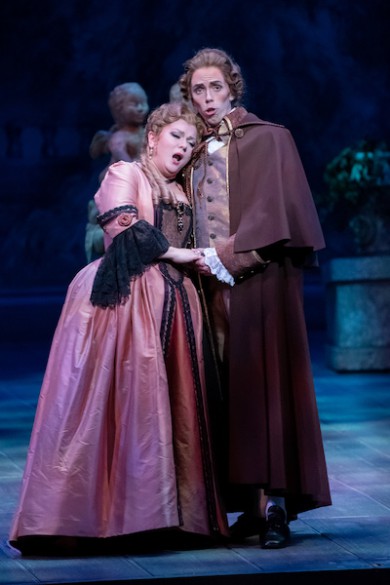Worthy singing yet comedic sparkle lacking in FGO’s “Figaro”

Lyubov Petrova and Jonathan Michie as the Countess and Count in Mozart’s “The Marriage of Figaro” at Florida Grand Opera.
Among operatic comedies, Le nozze di Figaro (The Marriage of Figaro) holds a special place. A collaboration between the dream team of Wolfgang Amadeus Mozart and librettist Lorenzo Da Ponte, the opera is an upstairs-downstairs tale of servants who scheme to bring a lecherous, arrogant aristocrat to his knees. Some of Mozart’s most spirited and glorious music adorns the score.
Florida Grand Opera’s production, which opened Saturday night at the Arsht Center in Miami, fields an attractive and talented young cast and sparkling musical direction by Andrew Bisantz. The fast-moving humor of French farce, however, is somewhat tame in Elise Sandell’s staging.
Susan Benson’s functional unit set makes a handsome backdrop and Helena Kuukka’s multihued lighting is so effective that the stage picture actually seems different between the servants’ quarters and the rooms and gardens of the palace even though the basic set is virtually the same.
Benson and Howard Tsvi Kaplan’s stylized costumes nicely differentiate between the social status of aristocrats, courtiers and servants but director Sandell tends to play the comedy too straight. While there were some funny moments (as in the insult duet between Susanna and Marcellina), the amount of laughter from the first-night audience was minimal. The comings and goings of the characters in the final garden scene definitely needed more animated pacing. At least the production avoided the tasteless vulgarities visited upon Mozart’s opera in some recent versions or an irrelevant updating of the libretto (as in one infamous production that set the action in the Trump Tower).
The cast was mostly up to the formidable demands of Mozart’s vocal writing, particularly the two female leads. As Countess Almaviva, Lyubov Petrova was royalty in more ways than one. Her aristocratic demeanor masked the anguish at her husband’s faithlessness but she could be playful with the page boy Cherubino and she brought off the final masquerade (disguised as her maid Susanna) with aplomb despite the stilted staging. Most importantly Petrova has a ravishing, sizable voice that can spin “Porgi amor” and Dove sono” in long legato phrases, her silvery top recalling Mozart sopranos of a bygone era.
The remainder of the cast was comprised of former and current members of the Florida Grand Opera Studio. It is a tribute to the growth and exponential rise in quality of the training program that their performances were so thoroughly professional and assured.
Hardly a damsel in distress, Elena Galván’s Susanna was a charmer with a tough edge who could hold her own against Count Almaviva’s amorous advances. Her light soubrette timbre contrasted aptly with Petrova’s weightier sound in the letter duet and she assayed “Deh vieni, non tardar” with fetching allure.
Galván had terrific chemistry with Calvin Griffin as her betrothed Figaro. Griffin was a cunning and athletic schemer as the palace’s jack of all trades. With his voluminous bass-baritone, Griffin registered Figaro’s anger when he thinks Susanna has betrayed him and brought showmanship to his mock military dressing down of Cherubino in “Non piu andrai.”
Today Count Almaviva’s high-handed attempts at seduction would make the front pages of the tabloids. Jonathan Michie’s booming baritone was deployed with subtlety and he played the jealous and hypocritical nobleman to the hilt. At the conclusion as Mozart’s music reaches the sublime with “Contessa perdono,” the Count’s plea for forgiveness, Michie was fully up to the task.
The weak link among the principals was Mariya Kaganskaya as Cherubino. Although she cut a dashing figure as the enamored page, her mezzo was not always under firm control. There was shrillness in the top register during her initial aria but “Voi che sapete” was considerably better and, as the evening progressed, the basic warmth of her timbre came into better focus.
Secondary roles were all strongly conveyed. Zaray Rodriguez, who has given some outstanding performances with the University of Miami’s Frost Opera Theater, was a larger-than-life Marcellina abetted by strong mezzo tones. Rafael Porto commanded the rapid buffo patter for Doctor Bartolo’s aria “La vendetta.” Simon Dyer proved a scene stealer as the drunken gardener Antonio and displayed a firm bass sound in the ensemble scenes. Dylan Morrongiello had the agile character tenor and slimy persona for Don Basilio. Evan Kardon (last season’s delightful Amor in Gluck’s Orfeo and Euridice) sang Barbarina’s aria in tones of plaintive beauty.
From the high-spirited overture, Bisantz kept the pace light and effervescent, drawing stylish Mozart playing from the orchestra. Wind and horn lines were finely pointed and he expertly balanced the singers in the ensemble scenes, with the timing and teamwork well coordinated. The chorus of peasants and courtiers, although full and well-voiced, was not always in synch with the pit.
Although not the last word in Mozart comedy, this Marriage of Figaro delivers some fine Mozart singing and orchestral playing. Hopefully some of the staging weaknesses will improve in the remaining five performances.
The Marriage of Figaro will be repeated 8 p.m. Tuesday and Thursday and 2 p.m. Sunday, February 3 at the Arsht Center in Miami and 7:30 p.m. February 7 and 6 p.m. February 9 at the Broward Center in Fort Lauderdale. fgo.org; 800-741-1010
Posted in Performances
One Response to “Worthy singing yet comedic sparkle lacking in FGO’s “Figaro””
Leave a Comment
Sun Jan 27, 2019
at 11:53 am
1 Comment





Posted Feb 10, 2019 at 6:46 am by Ronald Jackson
I was at the Broward Center 2/9 and the performance was
Stunning. The orchestra was beautiful and lively but not
over powering. Singing was superb